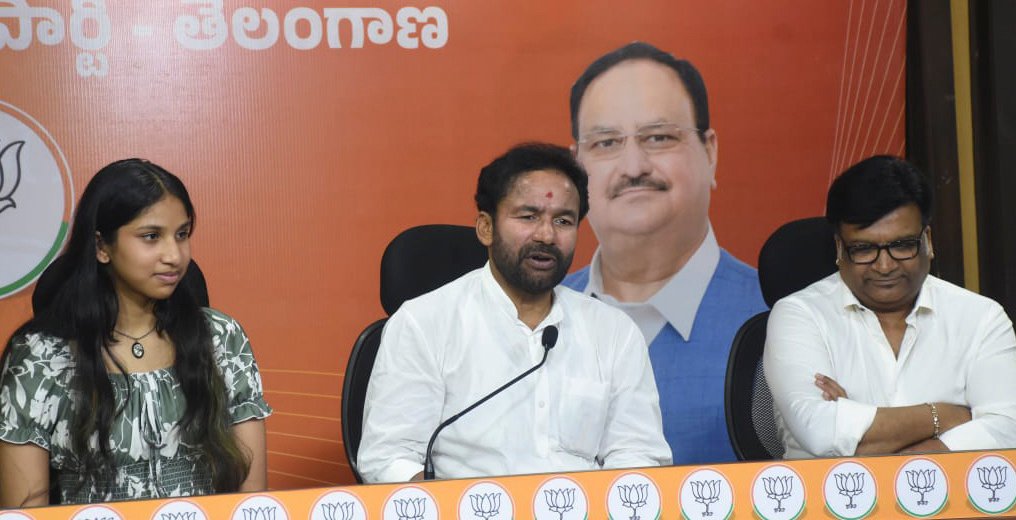Hon’ble Union Minister Shri G. Kishan Reddy Releases the Film
Hyderabad, October 2nd, 2024: Shri G. Kishan Reddy, Union Minister for Coal and Mines, Government of India, unveiled an inspiring short film titled “Tomorrow Will NOT Take Care of Itself” at a special event marking Swachh Bharat Diwas today. The thought-provoking film, written and directed by 15-year-old filmmaker Spoorthi Thea Vedula, highlights the far-reaching impact of human actions on the environment. Spoorthi, a passionate environmental advocate and a student at Chirec International School, uses her camera to convey the urgent need for environmental conservation. Through this film, she delivers a powerful message on the dire consequences of ignoring environmental challenges today.
At just five years old, when Spoorthi moved to India, she was deeply inspired by one of Prime Minister Shri Narendra Modi’s most impactful initiatives—the Swachh Bharat Mission. The nationwide campaign’s emphasis on cleanliness, public responsibility, and environmental conservation left a lasting impression on her young mind. The mission, which raised awareness across the nation and inspired millions to take ownership of public spaces and protect natural resources, continues to fuel her dedication to environmental conservation as a young filmmaker with a purpose.
Speaking on the occasion, Shri Kishan Reddy said, “At a young age, while still a student, Spoorthi demonstrated her sense of social responsibility through a powerful short film. Without using any dialogue, she conveyed a profound message entirely through visual storytelling—a feat that deserves wholehearted congratulations. Her film reminds us that if each of us became more environmentally conscious, large-scale initiatives like Swachh Bharat wouldn’t be as necessary. Environmental pollution is a major global challenge, and the topic is gaining prominence worldwide. During my election campaign in Jammu and Kashmir, I was struck by the serene beauty of the green hills, which seemed like paradise. However, stepping outside the state, I immediately encountered plastic waste and harmful materials—a stark contrast. It was this very issue that inspired our Hon’ble Prime Minister Shri Narendra Modi to launch the Swachh Bharat Mission on Mahatma Gandhi’s birth anniversary a decade ago.”
He continued, “The initiative has made such a widespread impact that even young children, like a 2nd-grade student, have embraced its message. Ironically, many of those harming the environment are educated individuals well aware of the consequences. To protect the environment, our Prime Minister launched the ‘Maa ke naam pe ek ped’ initiative, which promotes planting trees to protect our mother earth. Environmental concerns have transcended borders and become a global issue discussed at G20, G7, and UN conventions. Global warming and climate change are urgent challenges requiring drastic action. Spoorthi’s film is a wonderful example of how even the youngest among us can contribute to this critical global movement. We will extend all government support to help her produce more environmentally conscious short films.”
Spoorthi, speaking at the event, said, “Today marks the 155th Gandhi Jayanti and the tenth anniversary of the Swachh Bharat Mission, and I am immensely happy to release my short film on the environment. Ten years ago, I came to India, which coincided with the launch of the Swachh Bharat movement. Since then, I have witnessed an incredible transformation! People who once struggled with basic trash management in their own homes are now stepping out onto the streets with a newfound sense of pride, actively contributing to environmental cleanliness. The Swachh Bharat initiative has not only raised awareness but also ignited a sense of responsibility among citizens, turning cleanliness into a national mission and a collective achievement. This was made possible by the visionary leadership of Shri Narendra Modi and Shri Kishan Reddy.”
Through her film, Spoorthi Thea Vedula conveys a powerful message: every small action we take leaves a lasting impact on the environment. When these actions harm nature, the ripple effect circles back to affect us, our families, and our communities. By confronting people with the real, personal consequences of environmental neglect, Spoorthi’s film strikes a deeper emotional chord. This stark realization—that our everyday choices shape our future—awakens fear and, more importantly, the drive to act.
Spoorthi believes that showcasing these effects can inspire a sense of responsibility in citizens, urging them to become part of the solution and make meaningful changes to protect the planet.



